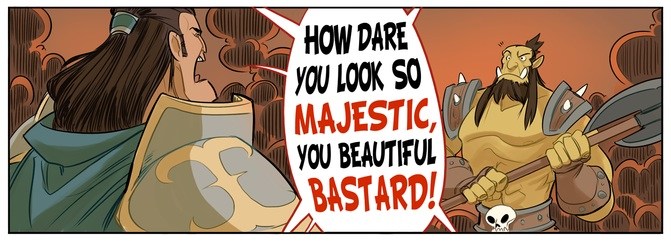
While on vacation I had a chat with a friend and fellow gamer that is facing a difficult situation. Two of his players who had been dating have now broken up. Can the game survive? What is he as DM to do to keep it going? It’s a tough situation and one I’ve seen from a few angles. Ultimately there is no single solution to this, but I do have some thoughts and experiences to share.
When I was in high school our D&D group had two players who had an on-again, off-again relationship. Now the good news for us was that they were already pretty flakey attendees to begin with, so we were kind of used to dealing with the fact that one or both of them might not be there. Our game therefore ended up somewhat insulated from their drama. The game kept to its regular schedule, and if one or both of them could make it, we were happy to have them. Fortunately they never brought the drama to the table, it was simply another factor that might keep one or both of them away.
I suspect this is the lightest case of this problem, but perhaps not uncommon if the two people involved are reasonable humans. I can certainly imagine a different case where players going through a break-up could be really disruptive at the table. But I do think there’s a lesson to be gleaned from my experience — that the goal must be to insulate the game from the relationship to allow it to survive. Were I running a game and going through this kind of thing now, I’d be tempted to become highly formal in my approach. I think I’d inform each player individually that the game would go on without them. Either or both are welcome to join provided they can leave their baggage at the door. Should it become an issue they’d both be asked to walk away to settle it between them, which is their responsibility to do. If they can’t be at the table together, then they must decide between them how to resolve that before either can rejoin the table.
I suppose that’s all easier said than done. Also for this to work the game has to have enough players to be playable with two less, which may actually be kind of difficult. I suppose you could try to recruit another person in, though you’d have to be OK with having more people at the table should the couple resolve their issues and both want to rejoin.
I’ve faced a similar problem when gaming with co-workers. I work in an industry that has a tendency to include a lot of role-players. This is a real boon when trying to form a game, but then also has the potential for the players to want to make it an “office game”. We’re all here already, we even have rooms with long tables and white boards on the walls, why not just play right here?
It’s a great idea, until it’s not. What if someone stops working for the company? Can they still play? In my case, I was the DM, and the person who stopped working at the company was me. Talk about awkward! The company was very gracious about it, but I did not want to return to the office every night to run the game. I offered the players a few options: I would run the game out of my house, or we could find a neutral location to play, or I would bow out and let someone else take over as DM. I tried very hard to remove myself from the decision making and let them figure out amongst each other what they wanted to do. They decided they’d all make the trek out to my house.
The game continued, but then got weirder. More players stopped working for the company, and soon we were about a 50/50 mix of employees and former employees. The game started to have a good 30 minutes at the front of bitching about the company. I was especially worried that the ex-employees might go too far in bad-mouthing the company to people still trying to make the best of working there. Whatever the moral ramifications of hosting this kind of get-together were, it certainly wasn’t adding to the fun, so ultimately I stopped the campaign.
It is now my policy to not run an on-going campaign at the office where I work. I will run occasional one-shot games at the office, they’re especially useful for practicing upcoming convention games, but I wouldn’t want to run anything with no explicitly planned end date. With large groups at a company in a volatile industry, the cards are really stacked against you.
Do you have any stories of games torn apart by a broken relationship? Do you have any good ideas on dealing with it? Please post in the comments below, I’d be very curious to hear more takes on this. As I stated at the start, I think there’s no silver-bullet to this problem, but it’s interesting to hear what others have encountered and I think helps us all be better prepared to find a way through future misfortunes.



We use a group chat to get our games together and I think that has helped mitigate some of the awkwardness. I have had a few people drop out of the years that I suspect is due to inter personal issues.
But with the group chat, its just “next game is Sunday…” and folks yeah or nay and that is sort of the end of it.
I don’t think I would ever start another work game after the last one morphed into my current game. Just too many other factors to consider. In fact other than the one grandfathered co-worker, I generally try to keep those two worlds apart now.
Avoiding work games is somewhat ironic for me as some of my best friends and most regular fellow gamers are the people I worked with at my first job. And certainly when I want to run something I turn first to my coworkers to pull from as they’re generally the sort to be interested in such things. I just find it helps to make sure the game takes place away from the office to physically reinforce the fact that this activity has nothing to do with work.
When I was running a game at the office, I even had an exec go so far as to list the game as a perk on recruitment info for new hires. I really disliked that, though I really disliked a lot of stuff that guy did, and am happy to no longer have to interact with him professionally or otherwise.
Yes, I’ve had long-running campaigns fall apart because of inter-personal relationships. I’ve had (and seen) whole gaming groups splinter because of it.
What can you do? Restrict a game to “boys (or girls) only?” When you have a good mix of people playing a game that builds not only camaraderie, but intimacy, sometimes romances are going to spring up. My thought is that gaming groups can survive break-ups when the relationship started outside and before the game started, but I’ve heard some real horror stories (mostly involving infidelities that involved other players at the table). Real ugly stuff.
My wife doesn’t game.
Interesting, I hadn’t thought of relationships that pre-existed vs. those springing up at the table, though I don’t think I’ve ever seen the latter. Infidelity with someone else also at the table sounds pretty egregious — I have no idea how a group could survive that.
My wife games sporadically, and I’m always looking for ways to tempt her back to the table. And I know several other married couples that game together. I have also had someone leave the game because he got married. I always scratched my head over that one — I’m not sure why marriage would require giving up any hobby, but I guess to each their own.
I agree there’s no reasonable preventative measure. I guess I was assuming the case of trying to find a way preserve the group when two individuals decide they can’t stand each other anymore. I’m not sure if having a larger group makes it easier or harder. On the one hand more people means it’s easier to run without either problem person, on the other it seems like more potential for side-taking.